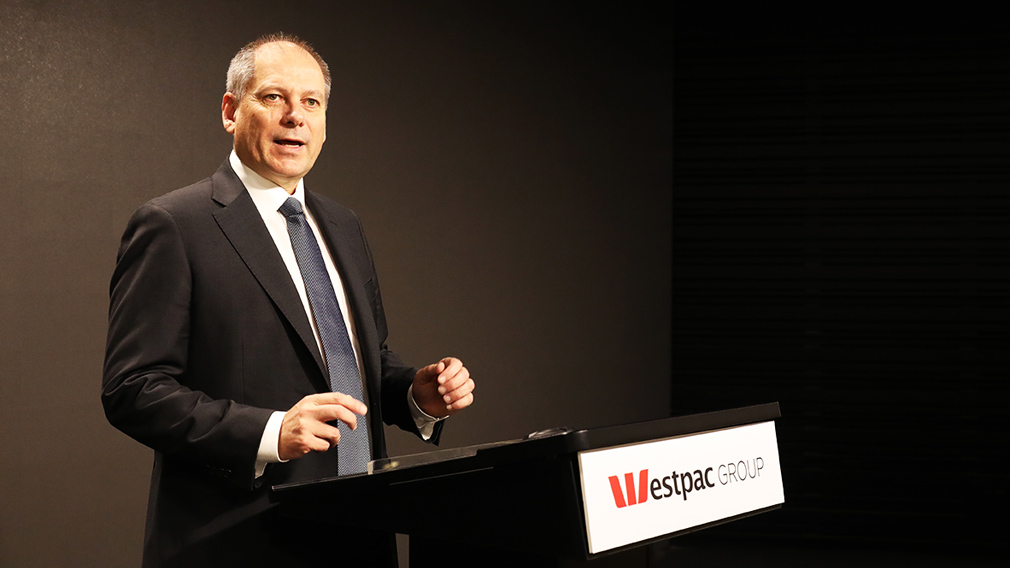Hartzer: Challenging result, resetting for the times
Westpac CEO Brian Hartzer discusses the bank’s FY19 results, the housing market, plans for a new digital-only banking platform and the economy. (Josh Wall)
Westpac chief executive Brian Hartzer says the bank will always prioritise financial strength after making the “difficult” decision to cut the final dividend and announcing that the bank would raise capital amid challenging conditions.
Handing down a 15 per cent fall in full-year cash earnings, Mr Hartzer said low interest rates, softer credit growth and remediation provisions had taken a toll on the results and conditions would likely remain “challenging”, prompting a handful of initiatives that included lowering the final dividend to 80c a share and seeking $2.5 billion via a capital raising.
He also unveiled plans to invest in a new digital-only banking platform that will initially operate as a “bank-as-a-service” model, via an expected deal with UK-based cloud banking technology provider, 10x Future Technologies.
Mr Hartzer said the capital raising and dividend cut were related issues. The capital raising reflected the need to maintain a buffer over APRA’s “unquestionably strong” capital benchmark, given uncertainty surrounding potential further changes to capital rules in Australia and New Zealand, while the change to the dividend was to bring the dividend payout ratio to a more sustainable level given the current conditions and the capital raising.
“There's one thing that's just non-negotiable for Westpac. It's that strength is our starting point. We always want to be in a position that if the economy turns down, we can continue to do our job and lend into the economy,” Mr Hartzer told Westpac Wire.
With regards to the dividend cut, Mr Hartzer added: “It was a very difficult decision because we know that a lot of our shareholders rely on the dividends and we want to continue to pay those dividends over time. When our capital position hopefully improves through earnings, we will be very pleased to be able to increase the dividend again from here.”
For the year to September 30, cash earnings fell 15 per cent to $6.85 billion impacted by lower margins from strong competition and provisions for estimated customer refunds, payments, associated costs and litigation, along with costs associated with the restructuring of the Wealth business. The common equity tier one capital ratio was little changed at 10.7 per cent, above APRA’s 10.5 per cent unquestionably strong benchmark.
Mortgage lending increased 2 per cent and deposits rose 1 per cent, while 90-plus day mortgage delinquencies rose 15 basis points.
Mr Hartzer said overall credit quality remained sound with the bank’s impairment charge of 11 basis points of gross loans still low historically. He added that the major housing markets of Sydney and Melbourne had turned following rate cuts and investors were returning to the market, spurring higher prices.
“However, the overall volume of sales is still relatively low, but nevertheless, that's positive…our ambition over the next 12 months is to get back to growing at around system rate of growth by the end of the year,” he said.
Ahead of the Reserve Bank’s monthly policy meeting tomorrow, Mr Hartzer said there were anecdotal signs that rate cuts were having the adverse flow-on effect of creating concern among customers about the health of the economy in the wake of three cuts to the cash rate this year to just 0.75 per cent.
“It’s certainly anecdotally consistent that customers are saying, ‘well, gee, low rates isn't necessarily going to encourage me -- it might tell me that maybe things aren't as good as they ought to be’,” he said.
Mr Hartzer added that weak business investment was the “major issue for the economy” and policymakers should prioritise “things that encourage businesses to invest, because ultimately we need businesses investing to drive growth, in the private sector to generate tax revenue to allow governments to continue to spend”.


